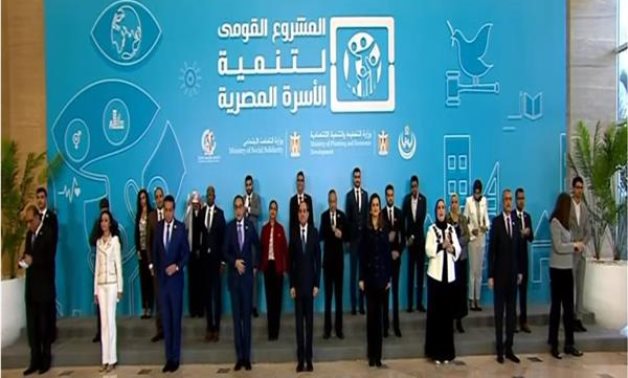
Launching of the National Family Development Project by President Abdel Fatah al-Sisi on February 28, 2022. TV screenshot
CAIRO – 28 February 2022: President Abdel Fatah al-Sisi launched Monday the National Family Development Project aimed at curbing population growth through various means.
Prime Minister Mostafa Madbouli noted, "in 1950, Egypt’s population stood at 20 million. Now, we are close to become 103 million. We increased fivefold."
Showcasing how overpopulation took its toll on the quality of life in Egypt, Madbouli said, "We already fell into water poverty, when the population size hit 60 million. Currently, the individual water share in Egypt is 550-580 cubic meters per year."
The prime minister also pointed out that the shortage in classrooms in Egypt is 40,000. He clarified that to build classrooms for 500,000 students per annum, the cost would be LE20 billion annually.
Minister of Planning and Economic Development Hala al-Said lamented that 2.5 million are born every year.
"We target enhancing the population’s characteristics, and not just curb population growth…Egypt’s 2030 Vision is a national version of the UN SDGs… Egypt spent $400 billion on the improvement of the quality of life since 2014." the minister highlighted.
The planning minister stated that high birth rates occur when the mother’s age is between 19 and 29. She added that birth rates reach five children per mother in some governorates.
Minister Said explained that the executive plan of the National Family Development Project consists of five axes. Those are women economic empowerment, ensuring free of charge access to birth control, promoting awareness, promulgating legislations, and offering monetary incentives.
Speaking of women economic empowerment, the target is females aged between 18 and 45. As for access to birth control, 1,500 female doctors have been trained to assume that mission at healthcare units nationwide.
With regard to awareness, it will be carried out through rural female community leaders who speak directly to women, and through movies and TV series. Regarding the monetary incentives program, a total of LE60,000 will be allocated to each female beneficiary of the program. To be eligible, the woman has to be aged between 21 and 40, and a newlywed.
The beneficiaries will be regularly screened for breast cancer, and be required to leave a gap between the birth of each of the two children among other requirements.
Acting Health Minister Khaled Abdel Ghaffar noted that Egypt launched 12 initiatives for the early diagnosis of certain diseases and free treatment to patients. The most prominent of those is 100 Million Healthy Lives launched in 2018 to screen citizens for hepatitis C and chronic diseases.
President Abdel Fatah al-Sisi underscored that three years ago, patients who were on surgeries waiting lists amounted to 10,000. Since then, we provided treatment to over one million patients.
President Sisi stressed the salience of encouraging students to study ICT technologies saying that "many major in non-science disciplines, just to have a university degree, and then complain they cannot find jobs, which is normal given that their skills do not match the market requirements."
The president stated that 300,000 graduates of computer science schools were tested to join an international programming study program, whose duration is 18 months, through a governmental scholarship. But, only 111 passed, the chief of state lamented.
Shedding light on the reasons behind overpopulation, Chairwoman of the National Council for Women (NCW) Maya Morsi said that some women give birth to many children so they make the divorce decision harder for their husbands, and some others, keeping giving birth to daughters until they get a male child.
Suggesting solutions, Minister of Social Solidarity Nevine al-Qabaj said that the professional role of women has to be enlarged so that they produce fewer children.
Comments
Leave a Comment